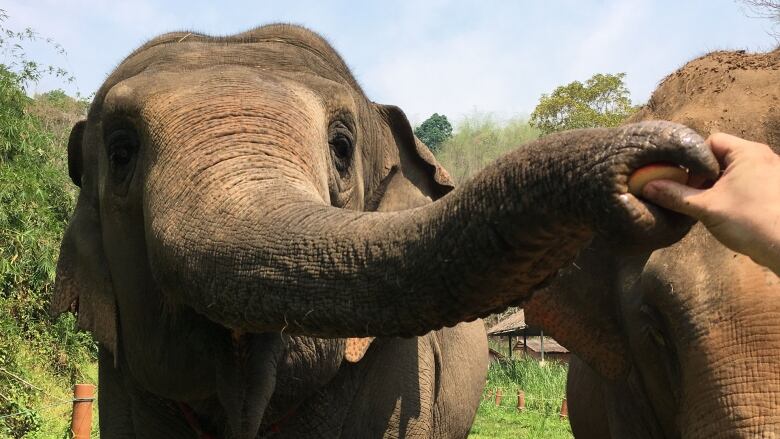The elephant's mathematical trunk can smell numbers
Asian elephants can distinguish small differences in quantities of food using smell alone

Elephants seem to have a capacity that no other animal is known to have. Using odour alone, they can tell whether buckets containing differing amounts of desirable foods contain more or less.
"Elephants are capable of doing something that a lot of other species are able to do using their eyes," Joshua Plotnik, the lead scientist on the project, told Quirks & Quarks host Bob McDonald.
Plotnik thinks this suggests that, in order to appreciate elephant intelligence, we need to understand how they likely rely on a different primary sense than vision to perceive the world and make decisions.
The sunflower seed test
The experiment involved six Asian elephants in captivity in Thailand.
To test their ability to distinguish quantities, Plotnik and his colleagues put different amounts of sunflower seeds — one of the animal's favourite foods — in buckets.
The researchers tested to see how accurately the elephants could detect different ratios of seeds in each bucket. The amount of sunflower seeds in each bucket ranged in the tests from four grams, or 30 seeds, to 24 grams, or 180 seeds. The buckets were capped with perforated lids so the elephants couldn't see the contents, but could smell it.
After many tests with different ratios of seeds, they found that the elephants were consistently accurate in picking the bucket with more seeds, suggesting that they had the ability to distinguish quantity by smell alone.
They were most accurate with large differences: 80 to 90 per cent of the time the elephants were able to distinguish 30 seeds from 180 seeds, and select the more abundantly filled bucket.
They did less well differentiating smaller differences, such as comparing 150 seeds to 180, which is a difference that humans would have difficulty distinguishing visually. But the bulls in particular, according to Plotnik, were frequently still able to pick the larger amount.
"One of them was scoring at above 80 per cent when you gave them the test, which is remarkable," said Plotnik, an assistant professor in the Department of Psychology at Hunter College in New York.

To make sure that they were indeed relying on their sense of smell to distinguish the buckets, the team did further tests with solid, unperforated lids to prevent smell information from getting to the elephants. In those scenarios, the elephants couldn't tell the buckets apart.
Elephants smell very well

The team says we don't know enough about elephant olfaction to know how they're doing this, though elephants are known to be very sensitive to odour.
"I don't think they're individually counting seeds," said Plotnik, "but they're measuring something about the content of these buckets that gives them olfactory information about which one has more versus less."
Plotnik says an elephant's sense of smell is crucial to their survival from helping them to navigate their environment to deciding where to find high-quality food.
Elephant family groups are led by matriarchs, who have to make important decisions about where to take their families to search for food. Usually, the journey is long, and the consequences of bad decisions could be huge.
Elephants also use their olfactory sense to smell predators and each other.
Saving elephants with smell
The results of the study also have implications for elephant conservation.
The Asian elephant population has decreased by more than 50 per cent over the last three generations. Habitat loss leading to elephant-human conflicts are a major contributor to this decline. Elephants will opportunistically raid crops and farmers will go to extreme lengths to protect their livelihood.
Farmers try to use things like firecrackers and electrical fences to discourage and keep elephants from their crops.
"The problem with these strategies is that it doesn't deal with the inherent need that the elephants have," said Plotnik. "And when you have an animal like an intelligent elephant, they're going to find a way through that fence."
Plotnik thinks we need to better understand the conflict from the elephant's standpoint to find ways to prevent it.
"Perhaps they have this desire for high-quality food that they don't have in their natural habitat," said Plotnik. "So could we fulfil those needs by providing them with high-quality food where they live, or could we mask crop odour with an olfactory cue that deters the elephants from going to the crops to potentially prevent the conflict?"
"All this means we need to have a better understanding of the elephants' perspective, the elephants' behaviour, and in this case, their olfactory sense."